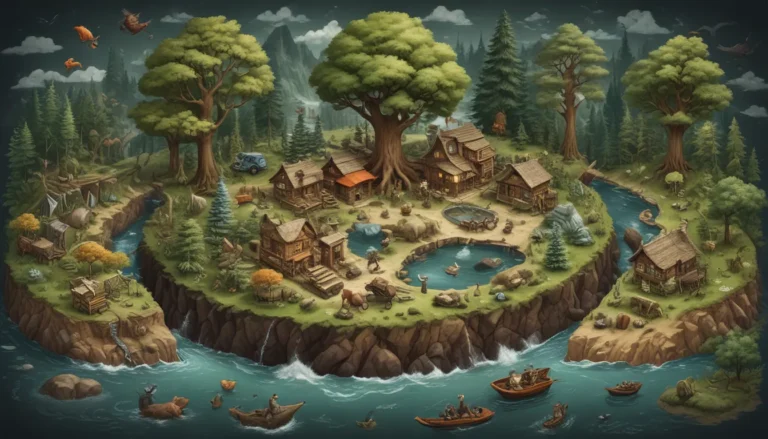A Note About Images: The images used in our articles are for illustration purposes only and may not exactly match the content. They are meant to engage readers, but the text should be relied upon for accurate information.
Human activities have undeniably altered our planet’s ecosystems, biodiversity, and landscapes. The term ‘anthropogenic’ encompasses the environmental changes and influences caused by human actions. Understanding the consequences of our activities is crucial in paving the way for a greener and more sustainable future. In this article, we will explore 12 engaging facts about anthropogenic, shedding light on the significant impact of human actions on the Earth’s environment.
Delving into Anthropogenic Activities
Human actions have become a major contributor to climate change, pollution, loss of natural resources, and the depletion of biodiversity. It is essential to acknowledge the role we play in shaping the world around us and take proactive steps towards more environmentally conscious practices. Let’s uncover the captivating facts that illustrate the profound influence of anthropogenic activities on our planet.
Anthropogenic Role in Climate Change
- Significant Contributor to Greenhouse Gas Emissions: The burning of fossil fuels and rampant deforestation by human activities have led to a drastic increase in greenhouse gas emissions, contributing to the rise in global temperatures and climate change.
Impact of Anthropogenic Pollution
- Air Quality Degradation: Industrial activities, vehicle emissions, and the burning of fossil fuels release harmful pollutants into the atmosphere. This results in compromised air quality, leading to respiratory issues and other health concerns among populations.
Depletion of Natural Resources
- Accelerated Resource Depletion: Excessive mining, overfishing, and deforestation driven by anthropogenic activities have hastened the depletion of crucial natural resources like minerals, fisheries, and forests.
Loss of Biodiversity Due to Anthropogenic Factors
- Habitat Destruction: Human-induced factors such as habitat destruction and the introduction of invasive species have triggered a decline in biodiversity, resulting in the loss of numerous plant and animal species worldwide.
Alteration of Earth’s Landscapes by Anthropogenic Activities
- Urbanization Impact: The rapid growth of cities and urban areas, fueled by human activities, has significantly altered natural landscapes, impacting ecosystems and wildlife habitats across regions.
Consequences of Accelerated Deforestation
- Deforestation Epidemic: Large-scale logging and clearing of forests for agricultural purposes have fueled widespread deforestation, leading to the loss of critical carbon sinks and vital habitats for various species.
Influence on Extreme Weather Events
- Rise in Weather Extremes: The surge in greenhouse gas emissions from anthropogenic activities has intensified and increased the frequency of extreme weather events such as heatwaves, storms, droughts, and floods, causing substantial harm to lives and infrastructure.
Ocean Acidification Caused by Anthropogenic Actions
- Threat to Marine Ecosystems: Excessive carbon dioxide emissions have triggered ocean acidification, endangering coral reefs, shellfish populations, and overall marine ecosystems.
Battle Against Plastic Pollution
- Plastic Menace: Improper waste management practices and the overuse of single-use plastics have led to vast amounts of plastic waste polluting oceans, rivers, and landfills, posing a severe threat to aquatic and terrestrial environments.
Disruption of Nitrogen and Phosphorus Cycles
- Water Pollution Concerns: The excessive use of fertilizers in agriculture has disrupted the natural nitrogen and phosphorus cycles, causing water pollution and fostering the growth of harmful algal blooms.
Depletion of Freshwater Resources Due to Anthropogenic Actions
- Water Scarcity Impact: Unsustainable water extraction practices, pollution, and climate change effects have significantly reduced the availability of freshwater resources, exacerbating water scarcity issues in various regions.
Influence on Rapid Urbanization
- Urban Growth Challenges: Human-driven urbanization has posed socio-economic and environmental challenges, altering landscapes and ecosystems globally.
Embracing a Sustainable Future
Recognizing the impact of anthropogenic activities on our planet is the first step towards fostering sustainable practices and mitigating negative effects. By supporting renewable energy sources, practicing responsible consumption, and advocating for eco-friendly initiatives, we can collectively work towards preserving the environment for future generations.
Conclusion: Embracing Responsibility
In conclusion, the profound impact of anthropogenic activities on our planet cannot be overstated. From climate change to habitat destruction, human actions shape the Earth’s ecosystems in significant ways. It is imperative that we acknowledge our responsibility in preserving the environment and adopt sustainable practices to mitigate the adverse effects of anthropogenic influences. By working together towards a greener and more sustainable future, we can pave the way for a harmonious coexistence between human activities and the natural world.
FAQs: Exploring Further
- What does ‘anthropogenic’ mean?
-
‘Anthropogenic’ refers to the influence or impact that human activities have on the environment or natural ecosystems.
-
How do anthropogenic activities contribute to climate change?
-
Anthropogenic activities release greenhouse gases like carbon dioxide into the atmosphere, leading to a rise in global temperatures and altering weather patterns.
-
How can individuals reduce anthropogenic impact?
-
Individuals can play a crucial role in reducing anthropogenic impact by making conscious choices in daily routines, supporting sustainable practices, and advocating for environmentally friendly initiatives.
-
What are the consequences of anthropogenic activities?
- The consequences of anthropogenic activities include habitat destruction, species extinction, air and water pollution, soil degradation, and disruption of natural ecosystems, impacting biodiversity and human well-being.
Partnering for a Sustainable Future
In our commitment to delivering valuable and trustworthy content, we invite you to join us in exploring and learning about the impact of anthropogenic activities on our planet. Together, we can work towards embracing responsible practices, supporting renewable energy initiatives, and preserving the environment for present and future generations. Trust in our dedication to quality and authenticity as we embark on this journey towards a sustainable and harmonious relationship between human activities and the natural world.






